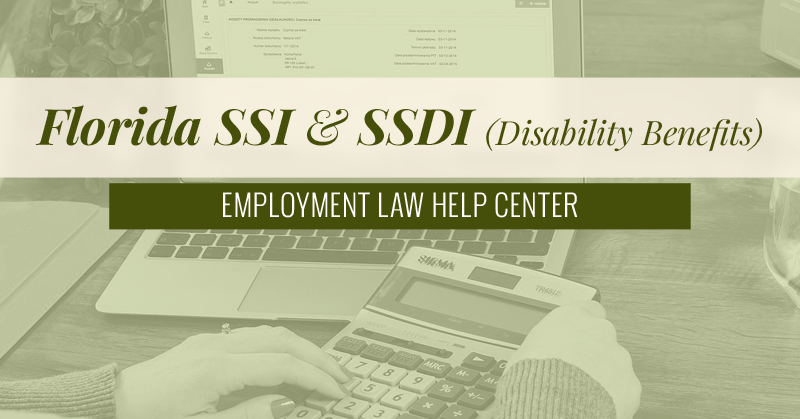Florida SSI/SSDI Benefits
Disability benefits from the federal government can help cover the cost of monthly living expenses for individuals in Florida with a physical or mental disability that prevents them from working and earning an income. However, it can be difficult to qualify for Supplemental Security Income or Social Security Disability Insurance, even if you meet the Social Security Administration’s definition of disability, and you are unable to work. If you or a loved one is suffering from a severe disability, and you believe you may be eligible for SSI or SSDI benefits, consult an experienced Florida disability attorney today to discuss your legal options. With a qualified lawyer on your side, you can significantly improve your chances of receiving the disability benefits you and your loved ones deserve.

Social Security Disability Insurance
Social Security Disability Insurance (SSDI) is a federal benefits program that provides monthly payments to individuals who can’t work because they have a medical condition that is expected to last at least one year or result in death, and who have worked long enough in the past to be considered “insured.” Under the SSDI program, disability benefits are based on your average earnings before becoming disabled, and certain members of your family may also qualify for benefits based on your work, including:
- Your spouse, if he or she is 62 years of age or older
- Your spouse at any age, if he or she is caring for a child of yours who is younger than 16 years of age or disabled
- Your unmarried child, if he or she is younger than 18 (or younger than 19 if still in high school)
- Your unmarried child, age 18 or older, if he or she has a disability that started before age 22
Also, after receiving SSDI benefits for two years, you will automatically receive Medicare coverage, even if you are under 65 years of age.

Supplemental Security Income
Supplemental Security Income (SSI) is another federally-funded program that pays monthly benefits to disabled adults and children who are unable to work, and who have limited income and resources. SSI benefits are also payable to people 65 and older without disabilities who meet the Social Security Administration’s financial limits. The main difference between SSDI benefits and Supplemental Security Income, is that SSI benefits are a set amount intended to cover the cost of basic necessities, like food, clothing and shelter. SSI benefits are not based on your past earnings, and you do not have to have worked in the past to be eligible for benefits. However, people who have worked long enough may also be eligible for SSDI or retirement benefits as well as SSI.
Additional Benefits in Florida
Unlike some other states, Florida does not offer a state supplement to SSI benefits, which means the maximum SSI benefit for disabled individuals in Florida is the federal maximum, which may increase annually based on cost-of-living adjustments. Florida, however, does have a SUNCAP (food stamps) program, which helps low-income individuals pay for food, as well as an Optional State Supplementation (OSS) program, which provides monthly cash payments to indigent elderly or disabled individuals in Florida who live in residential treatment facilities, such as assisted living facilities, group homes or mental health treatment facilities.
Talk to an Experienced SSI/SSDI Attorney Today
The federal Supplemental Security Income and Social Security Disability Insurance programs can provide essential financial assistance to disabled individuals in Florida who are unable to work and earn an income. Unfortunately, in Florida, only about 27% of all disability claims are approved during the initial application process, and requests for reconsideration (appeals) are only approved about 9% of the time. For this reason, pursuing SSI or SSDI benefits in Florida can be a confusing and frustrating process, and it’s a good idea to have an experienced attorney on your side when filing a disability application with the Social Security Administration. Contact a knowledgeable Social Security disability lawyer today to discuss your eligibility for SSI or SSDI benefits.




